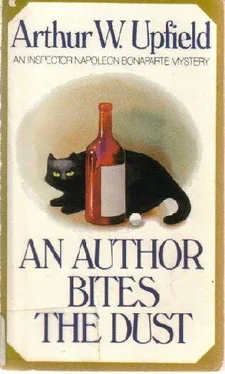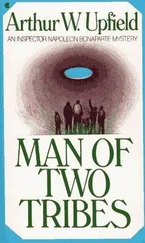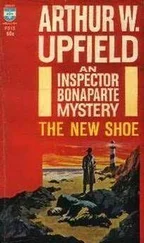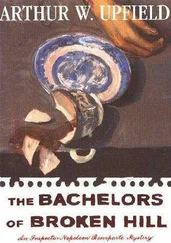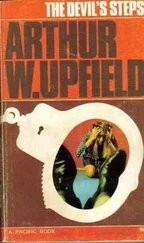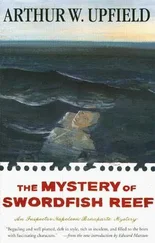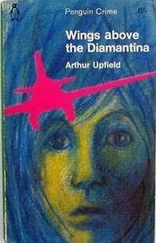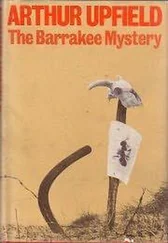Arthur Upfield - An Author Bites the Dust
Здесь есть возможность читать онлайн «Arthur Upfield - An Author Bites the Dust» весь текст электронной книги совершенно бесплатно (целиком полную версию без сокращений). В некоторых случаях можно слушать аудио, скачать через торрент в формате fb2 и присутствует краткое содержание. Жанр: Классический детектив, на английском языке. Описание произведения, (предисловие) а так же отзывы посетителей доступны на портале библиотеки ЛибКат.
- Название:An Author Bites the Dust
- Автор:
- Жанр:
- Год:неизвестен
- ISBN:нет данных
- Рейтинг книги:5 / 5. Голосов: 1
-
Избранное:Добавить в избранное
- Отзывы:
-
Ваша оценка:
- 100
- 1
- 2
- 3
- 4
- 5
An Author Bites the Dust: краткое содержание, описание и аннотация
Предлагаем к чтению аннотацию, описание, краткое содержание или предисловие (зависит от того, что написал сам автор книги «An Author Bites the Dust»). Если вы не нашли необходимую информацию о книге — напишите в комментариях, мы постараемся отыскать её.
An Author Bites the Dust — читать онлайн бесплатно полную книгу (весь текст) целиком
Ниже представлен текст книги, разбитый по страницам. Система сохранения места последней прочитанной страницы, позволяет с удобством читать онлайн бесплатно книгу «An Author Bites the Dust», без необходимости каждый раз заново искать на чём Вы остановились. Поставьте закладку, и сможете в любой момент перейти на страницу, на которой закончили чтение.
Интервал:
Закладка:
At last Ella managed to say between sobs, “Mervyn! The men went to call Mervyn to breakfastThey say he’s dead. He’s lying just inside the door of his room. The door was shut, and he couldn’t get out. He tried to claw the door open, but-he-couldn’t get out.”
Chapter Two
Miss Pinkney’s Lodger
LIKE a fledgling bird, Miss Pinkney was all a-flutter. Her heart was fluttering with excitement, her feet fluttered in and out of the rooms of her cottage. Once she went to the front veranda to gaze with critical eyes at the crazy pavement extending to the front gate. Once she went to the back of the cottage and gazed over the well-tended vegetable garden to the line of lilac-trees masking the rear fence and partially obscuring the cream-painted building beyond, the building in which Mervyn Blake, the great Australian author and critic, had died from apparently natural causes.
Miss Pinkney was finding life most interesting. Indeed, she had found it so the moment she learnt that Mr Mervyn Blake had rented the property beyond her own. Thereafter her sedate and somewhat bucolic life was enlivened by interest piled upon interest in the visits to theBlakes of famous authors, artists, and radio personalities.
Thencame the discovery of Mervyn Blake dead in his writing-room at the bottom of his garden, the building just beyond Miss Pinkney’s back fence. For days the police were all over the place. They even raised their heads above the division fence and stared at Miss Pinkney when the hem of her skirt was pinned to her waist and she was wearing old shoes andgardening gloves, being then engaged with her vegetables.
She had wanted to pay a call on the poor little widow, but she felt that it would not be appreciated by a woman who had never given the faintest sign of neighbourliness. And the peculiar thing about the matter was that it seemed the coroner could not make up his mind what Mr Blake had died of.
That was weeks ago, and then, just when life threatened to become once more bucolic, that nice Constable Simes had stopped her in the street and told her he would be much easier in his mind if she got someone to live with her, since there was a positive crime wave in Melbourne. She had told Constable Simes that she hadn’t a relation or a friend who could possibly come and live withher, and at that the dear constable promised he would find a boarder for her, someone quiet and genteel.
The very next day he had called to tell her he had found just the ideal gentleman he had had in mind, and she had consented to accept this paying guest. Now he was due to arrive and she and her house were dressed in their best. But wait!
Where was Mr Pickwick? She had actually forgotten to change Mr Pickwick’s collar. What a mercy she had remembered it in time. She flew to the kitchen, then out to the back garden crying, “Mr Pickwick! Dear Mr Pickwick! Where are you?”
An enormous all-black cat emerged from the shadow cast by a camellia bush and followed Miss Pinkney to the house. There she removed a stained blue silk collar looking much like an early Victorian garter, and placed about Mr Pickwick’s neck a similar item of orange. It was then that someone knocked upon the front door.
Uttering a little cry Miss Pinkney rushed to the mirror hanging behind the kitchen door, patted her hair and the collar of her old-fashioned bodice, and fluttered along the passage to the hall and the front door.
“Miss Pinkney?” inquired the caller.
“Yes! Oh yes! You are-”
“Napoleon Bonaparte. Constable Simes has told me about you and that you are willing to give me a haven of rest and peace for a week or two.”
“Yes, that’s right, Mr Bonaparte,” she hastened to assure him. “Oh, I see you’ve brought your luggage. Will you bring it in? I’m so sorry I haven’t a domestic-please do come in.”
Detective Inspector Napoleon Bonaparte had removed his hat and now smiled upward at Miss Pinkney who was standing on the topmost of the three steps to the veranda. He saw a slim woman dressed in grey, her hair greying, her small face coloured by excitement, her prominent grey eyes bright and warm.
“Thank you,” he said. “I’ll get my case. What a charming house you have. What a beautiful garden. Oh!”
The enormous cat appeared beside Miss Pinkney’s brown house shoes.
“This, Mr Bonaparte, is my Mr Pickwick,” announced Miss Pinkney.
The cat marched down the steps, tail erect, great golden eyes examining the stranger. Bony stooped and stroked the animal and Mr Pickwick purred.
“You adore cats, I can see,” Miss Pinkney cried happily.
The paying guest admitted that he adored cats, and when he turned and walked to the gate for his case Mr Pickwick waddled after him. He waddled behind Bony on the return journey to the front veranda.
“Please come in,” Miss Pinkney cried. “I’ll show you to your room. Yes, do come in. It’s so warm out in the sun today.”
She preceded her guest into the hall, on the panelled walls of which hung three large pictures in oils of sailing ships. Bony’s gaze passed from them to the ship’s oil lamp suspended from a bracket fixed to the wall near the opposite door. Miss Pinkney halted beside a door on the right, and she smiled at him and gave a little bow of invitation for him to enter.
Murmuring his thanks, he went in. The walls were of wood stained mahogany. The bed was a ship’s bunk, broad and long and inviting. Above the bunk was a ship’s brass port, the inside painted bright blue to resemble the sky. The floor was polished and unspoilt by coverings. A large table and two easy chairs, an open-fronted case filled with books, a standard lamp and a brass spittoon completed the furniture. Bright cretonne curtains ornamented the casement windows.
Bony put down his case and dropped his hat upon the table. He turned then to see Miss Pinkney still standing just outside the door. She was looking at him anxiously, her hands clasped and stilled against her flat breast.
He said, “I like this room-very, very much.”
The anxiety vanished, and the wordscame tumbling.
“Oh, I’m so glad you like your room, Mr Bonaparte,” she cried. “It used to be my brother’s room, you see. He loved it. He was a sailor, you know. He commanded ships. We were very happy here at Yarrabo, though he missed the sea after he retired. Poor man, he died four years ago. If you wish, I will show you the bathroom and the dining-room and the lounge. Then I’ll serve you with afternoon tea. Do you like afternoon tea?”
His deep blue eyes beamed at her and he gave her a hint of a bow, saying, “Madam. I like tea at any hour of the day and of the night.”
The dining-room contained additional evidence of the departed sea captain, but the lounge belonged entirely to Miss Pinkney. The floor was covered by a white and gold Chinese carpet. Books rested everywhere. Framed photographs on the mantelpiece flanked the enlarged portrait of a vitriolic-looking man in the summer uniform of a captain in the mercantile marine. It was a woman’s room with its cut flowers, its soft divan, and invitingpouffes.
Mr Pickwick came in and parked on the hearth rug. Miss Pinkney entered trundling a tea wagon, and Bony rose to assist her. Fifty and lonely, celibacy had not soured her. He had expected to meet an eccentric woman who lived alone with her cat, and he was feeling the warmth of a mind that life had never defeated. She was as excited as a child of twelve, and she made no attempt to conceal the pleasure his advent gave.
The cat advanced to his feet, and he put down the fragile blue and white cup and saucer on the trolley that he might stroke Mr Pickwick. Mr Pickwick loudly purred and rubbed himself against Bony’s elegantly trousered leg, and Bony said, “Mr Pickwick, you have that which few cats possess-personality.”
Читать дальшеИнтервал:
Закладка:
Похожие книги на «An Author Bites the Dust»
Представляем Вашему вниманию похожие книги на «An Author Bites the Dust» списком для выбора. Мы отобрали схожую по названию и смыслу литературу в надежде предоставить читателям больше вариантов отыскать новые, интересные, ещё непрочитанные произведения.
Обсуждение, отзывы о книге «An Author Bites the Dust» и просто собственные мнения читателей. Оставьте ваши комментарии, напишите, что Вы думаете о произведении, его смысле или главных героях. Укажите что конкретно понравилось, а что нет, и почему Вы так считаете.
